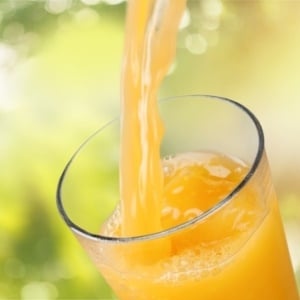
"This short-term study suggests that orange juice consumption could result in biochemical modification of stone risk factors; however, additional studies are needed to evaluate its role in long-term prevention of recurrent nephrolithiasis [kidney stones],” wrote author Dr Clarita Odvina in the Clinical Journal of the American Society of Nephrology (doi: 10.2215/CJN.00800306 ).
Kidney stones develop when the urine is too concentrated, causing minerals and other chemicals in the urine to bind together. Over time, these crystals combine and grow into a stone.
More than one million people a year get kidney stones in the US alone, and the numbers are growing. Some experts have linked this increase to the popularity of high-protein diets like Atkins, causing an imbalance of acidic and alkaline foods in the diet.
All citrus juices contain citrate, a negatively charged form of citric acid that gives a sour taste to citrus fruits, and an important acid neutraliser and inhibitor of kidney stone formation. The new research, however, reports on orange juice and lemonade, juices with comparable citrate contents. The researchers found that the components that accompany the citrate can alter the effectiveness.
The research study
Thirteen volunteers (nine healthy subjects and four stone formers) were randomly assigned to undertake weekly interventions to drink one litre every day of distilled water, orange juice, or lemonade while on a constant metabolic diet. Three-week washout periods separated the interventions.
The risk of forming kidney stones was assessed by measuring urine concentrations of calcium, urinary oxalate, and uric acid.
Odvina reports that, while urinary calcium levels did not differ between the groups, urinary oxalate was higher during the orange-juice phase, and uric acid was lower in the orange-juice phase compared with both control and lemonade phases. Crystallisation of uric acid and calcium oxalate are the most frequently found ingredients in kidney stones.
"Orange juice could potentially play an important role in the management of kidney stone disease and may be considered an option for patients who are intolerant of potassium citrate," said Odvina.
Different constituents in beverages
The difference between the juices may be due to the different constituents of various beverages, she said.
This is based on the citrate in orange and grapefruit juice being accompanied by a potassium ion while the citrate in lemonade and cranberry juice is accompanied by a hydrogen ion. Ions of hydrogen, but not potassium, counteract the beneficial effects of the high citrate content, said Odvina.
"There is an absolute need to consider the accompanying positive charge [of hydrogen ions] whenever one assesses the citrate content of a diet," she said. - (Decision News Media, September 2006)




 Publications
Publications
 Partners
Partners










